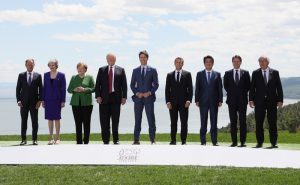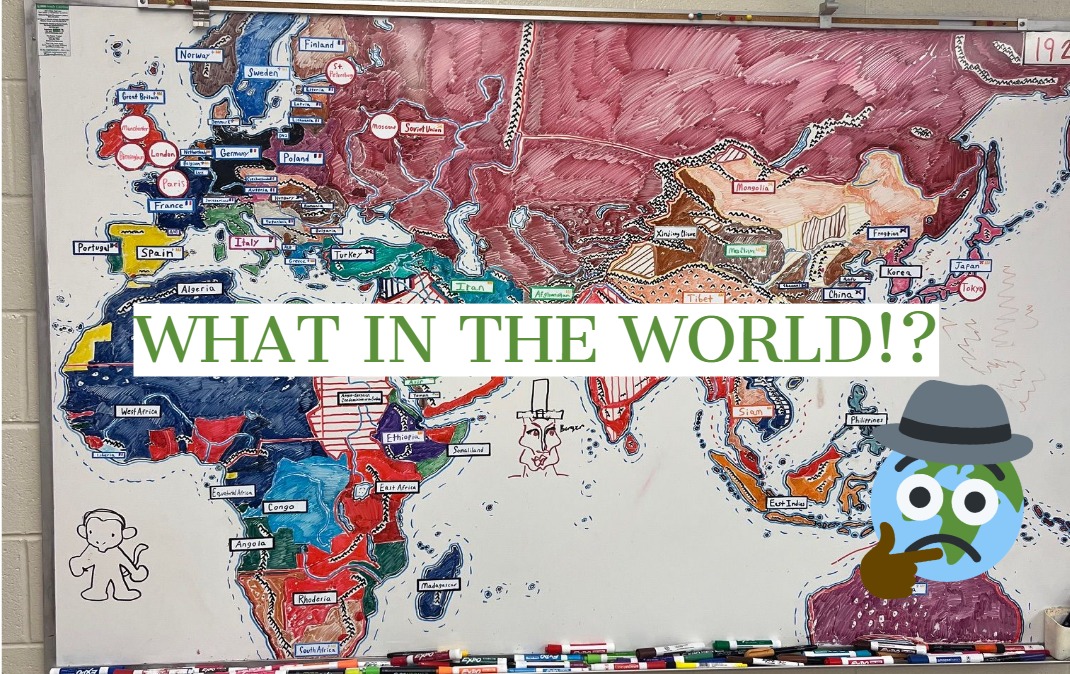G7 Blue Spin
The left is always right.
September 13, 2019
The end of last month saw world leaders from the world’s seven largest economies according to the International Monetary Fund as well as the European Union meet in France for the 45th G7 Summit. The attendees included host Emmanuel Macron of France, Canada’s Justin Trudeau, Angela Merkel of Germany, Giuseppe Conte of Italy, Shinzō Abe of Japan, recently elected Boris Johnson representing the United Kingdom, the EU’s Donald Tusk and Jean-Claude Juncker, and, of course, US President Donald Trump. The objective of the summit in Biarritz was to discuss world trade and peaceful relations in the Middle East as it relates to assistance from the world’s major players.
Unfortunately, our very own Commander-in-Chief made the decision to skip important meetings, including those on the topic of climate change. One of the most prominent pictures from the days in France is of an empty chair, a chair that was supposed to be occupied by President Trump. In the context of these conferences of the world’s powers, Trump has put the US in the world spotlight for all the wrong reasons. As an economic powerhouse and the “leader of the free world,” absence from major policy discussion and world issue solutions is not the message we need to send.
Trump used meetings with leaders from India and Germany as an excuse for his limited availability during the day, but attendance by each of these leaders calls his alibi into question. Due to a widely held belief that the US economy is far superior to the other six, many saw his attendance as just “playing nice” or honoring the rest, yet what they have yet to see is the risks we face in not helping others. The more removed we become both through choice and burned bridges, the worse the world economy suffers. As the biggest player in the world economy, we too will gravely suffer. An article just before the summit published by the New York Times laid it out plainly, saying “a recession results when some widely held belief about the world turns out to be false. . . This time around, the belief in doubt is that the world will only become more stable and interconnected over time, and that trade, currency and diplomatic relationships can be counted upon.” Clearly, relations do not seem stable and few can count on strong trade with tariffs hurting our farmers and producers while Kim Jong-Un, Putin, and Xi Jinping control things to the east. However, we as a nation can help to stabilize the world economy preventing the worst, but we must be cooperative and responsible.
Furthermore, the summit, along with the recent onslaught of natural disasters, brings into mainstream discussion the rapid change of our climate, breaking the cycle of a slow shift between colder and warmer temperatures. Whereas the climate used to move like a slow pendulum, it now comes closer to a game of ping-pong with harsher storms and searing summers each year.
However, much of the current administration has shied away from combating climate change head-on. Agencies such as the Environmental Protection Agency have begun to roll back protections, leaving ecosystems in the US and the nations we support in danger. Furthermore, Trump has opted to use the next summit to prop up his own business interests that have suffered in the divisive political climate of 2019 by endorsing his own Trump National Doral Miami resort and golf course to host. Despite claims that he doesn’t care about the money since he’s losing billions as president, he continues to try to send leaders to Trump facilities. For instance, following the summit, Vice President Pence was encouraged to stay at the Trump resort in Ireland for meetings in Dublin despite the two locations being on opposite coasts. Furthermore, the argument that he is losing money as the president is deeply flawed. Not only does it rely on the assumption that his businesses would be booming under different circumstances, but it also unfairly implies he is making a sacrifice for the American people.
Overall, the G7 Summit was a poor showing for the United States. We displayed a lack of willingness to use our resources to advance the state of the world and be proactive in solving global issues. Furthermore, our representation proved more interested in their own concerns rather than any of international or even national significance. Let’s hope for a strong recovery to host a respectable summit next year.













